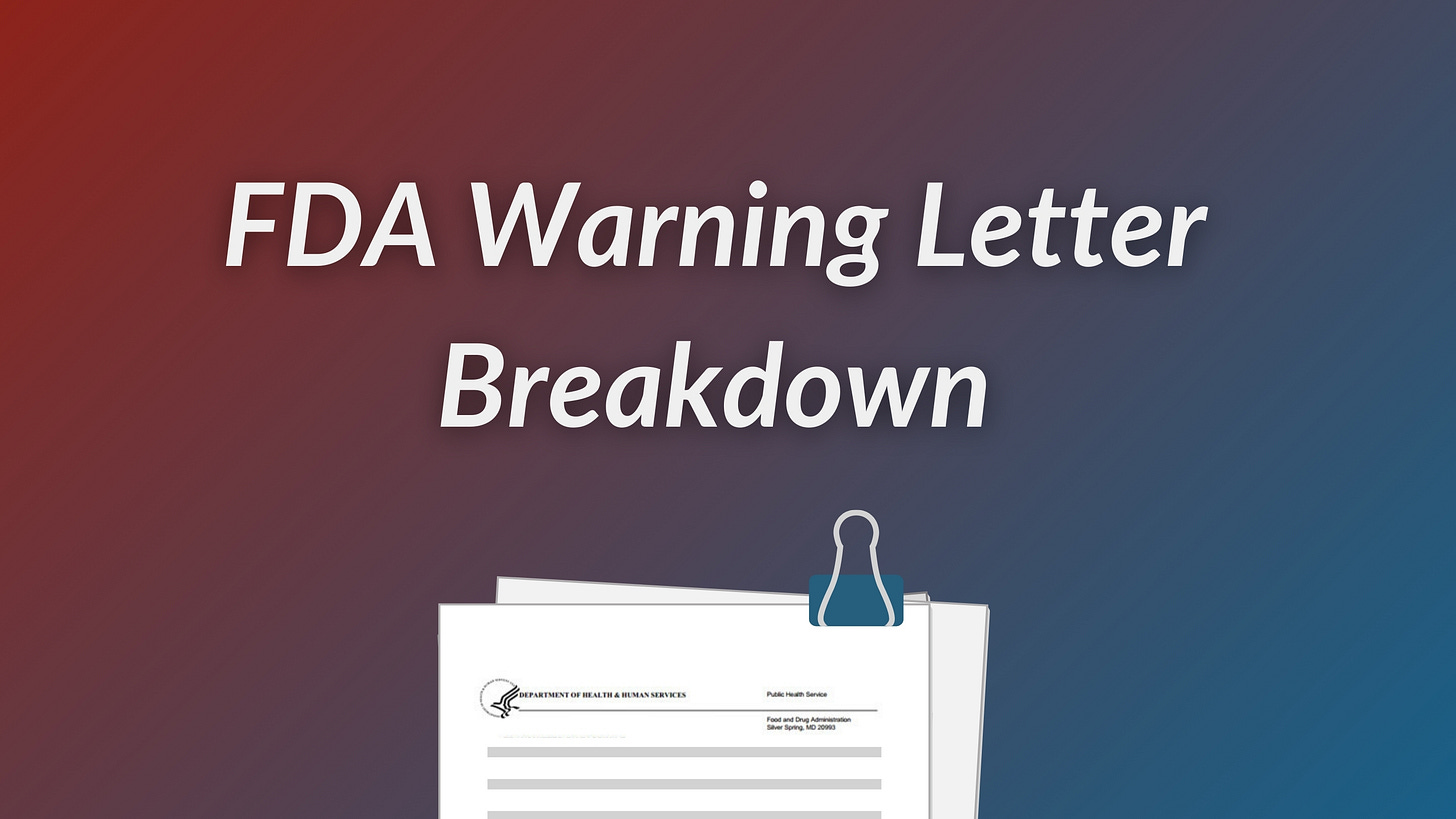Inside the FDA Warning Letter Over the Study of a Rejected Rare Disease Drug
Following the FDA’s rejection of Applied Therapeutics’ experimental drug for classic galactosemia, the company announced that it also received a warning letter for the drug's pediatric study.
This breakdown is available for paid subscribers. Only paid subscribers get regular full access to our breakdowns and other analyses. If you’re not already a paid subscriber, you can upgrade here.
In an SEC filing, Applied Therapeutics disclosed that the warning letter addresses issues previously encountered during a study involving 47 children. According to the company, the FDA’s review of the study “identified issues related to electronic data capture, which the Company believes were addressed in prior communications with the agency, including by providing detailed paper and video records.”
The FDA warning letter, posted a few days ago, reveals that in March, two days after the agency preannounced its inspection of a clinical site, a third-party vendor contracted by Applied “deleted electronic data in Q-global®, including associated audit trails, for the [redacted] for all 47 subjects enrolled in the study at all [redacted] clinical sites. As a result, during the sponsor inspection, FDA was unable to access and copy and verify records and reports relating to the study.”
Applied also stated that the FDA’s letter “refers to a dosing error in the dose escalation phase of the study resulting in slightly lower levels than targeted in a limited number of patients, which was remedied prior to achieving maintenance dosing.” The company noted that this information had already been shared with the agency.
However, the FDA’s letter criticized Applied Therapeutics for “fail[ing] to provide sufficient information at the time of submission of the application to enable FDA to make an informed decision regarding the impact of the dosing-error incident on study data.”
“While we acknowledge Applied Therapeutics’ response, as well as the corrective and preventive actions that Applied Therapeutics has taken and plans to take, your response is inadequate because you did not include sufficient details about your corrective action plan,” the FDA stated. “For example, you did not provide sufficient details regarding the procedures being implemented to prevent similar violations in the future.”
Classic galactosemia, a rare disease diagnosed in infants, prevents the body from breaking down galactose, a sugar found in dairy. The rejection and warning letter are the latest setbacks for govorestat, the drug at the center of this controversy.
In clinical trials, govorestat failed to meet its primary endpoint, a composite of clinical measures related to the disease. Applied instead highlighted secondary and post-hoc analyses of tremor and behavior in its FDA application. Initially scheduled for an approval decision in August, the FDA delayed its ruling and planned an advisory committee meeting. But in September, the agency canceled the meeting, which investors interpreted as a positive signal, briefly boosting Applied’s stock by 69%.
Let’s take a closer look at the warning letter and draw some lessons from it.
Failure to provide FDA access to clinical trial records
"On March 27, 2024, two days after FDA preannounced its inspection of one of the clinical sites, Site (b)(4), a third-party vendor contracted by Applied Therapeutics deleted electronic data in Q-global®, including associated audit trails, for the (b)(4) for all 47 subjects enrolled in the study at all (b)(4) clinical sites."
The FDA discovered the deletion of essential clinical trial data just before an inspection. The company had used Pearson's Q-global® system to capture electronic clinical outcome assessments (eCOAs) for both primary and secondary efficacy endpoints.
But when FDA investigators attempted to verify this data, they discovered that it had been deleted by a third-party vendor, including the audit trails, for all 47 study subjects. Although some data was recovered from backups, electronic source data for 11 subjects was permanently lost.
As a result, the FDA was unable to verify the accuracy and integrity of crucial efficacy endpoint data. While the company implemented corrective actions, including new backup procedures and vendor controls, the FDA found their response inadequate due to insufficient detail in the preventive action plan.
Failure to disclose critical safety and efficacy information
"Applied Therapeutics failed to provide FDA with any description or analysis of the information describing the nature and extent of the dosing errors related to the mislabeled (b)(4). Specifically, Applied Therapeutics reported dose levels for subjects as stated in the protocol (for example, (b)(4) mg/kg), rather than the actual dose levels administered."
The FDA discovered that between March and June 2021, the company's clinical sites administered incorrect doses due to mislabeled study drug. The medication concentration was lower than labeled, resulting in at least 19 subjects receiving only 80% of the protocol-required dose.
Instead of disclosing and analyzing the impact of this error, Applied Therapeutics reported the protocol-specified doses in their documentation rather than the actual administered doses.
This omission prevented the FDA from evaluating the impact of the dosing errors on safety and efficacy. The company's failure to provide this critical information raised significant concerns about its clinical trial oversight and compliance with reporting requirements. This finding was not included in the original Form FDA 483, and therefore, the company had not previously responded to this issue.
A few lessons
The deletion of critical trial data by a third-party vendor highlights several essential lessons:
Sponsors must maintain ultimate control over their clinical trial data, even when using third-party systems. Delegating data management to vendors without proper controls can jeopardize an entire clinical program. The firms that do this best mirror all data entered into third-party systems — automatically replicating it to sponsor-controlled servers. A sponsor using a third-party EDC system should configure automated daily exports of all raw data, metadata, and audit trails to their own validated data warehouse.



